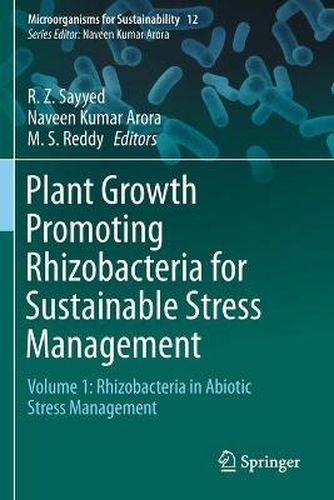Readings Newsletter
Become a Readings Member to make your shopping experience even easier.
Sign in or sign up for free!
You’re not far away from qualifying for FREE standard shipping within Australia
You’ve qualified for FREE standard shipping within Australia
The cart is loading…






This title is printed to order. This book may have been self-published. If so, we cannot guarantee the quality of the content. In the main most books will have gone through the editing process however some may not. We therefore suggest that you be aware of this before ordering this book. If in doubt check either the author or publisher’s details as we are unable to accept any returns unless they are faulty. Please contact us if you have any questions.
Increasing agro productivity to feed a growing global population under the present climate scenario requires optimizing the use of resources and adopting sustainable agricultural production. This can be achieved by using plant beneficial bacteria, i.e., those bacteria that enhance plant growth under abiotic stress conditions, and more specifically, microorganisms such as plant growth promoting rhizobacteria (PGPR), which are the most promising candidates in this regard. Attaining sustainable agricultural production while preserving environmental quality, agro-ecosystem functions and biodiversity represents a major challenge for current agricultural practices; further, the traditional use of chemical inputs (fertilizers, pesticides, nutrients etc.) poses serious threats to crop productivity, soil fertility and the nutritional value of farm produce. Given these risks, managing pests and diseases, maintaining agro-ecosystem health, and avoiding health issues for humans and animals have now become key priorities. The use of PGPR as biofertilizers, plant growth promoters, biopesticides, and soil and plant health managers has attracted considerable attention among researchers, agriculturists, farmers, policymakers and consumers alike. Using PGPR can help meet the expected demand for global agricultural productivity to feed the world’s booming population, which is predicted to reach roughly 9 billion by 2050. However, to do so, PGPR strains must be safe for the environment, offer considerable plant growth promotion and biocontrol potential, be compatible with useful soil rhizobacteria, and be able to withstand various biotic and abiotic stresses. Accordingly, the book also highlights the need for better strains of PGPR to complement increasing agro-productivity.
$9.00 standard shipping within Australia
FREE standard shipping within Australia for orders over $100.00
Express & International shipping calculated at checkout
This title is printed to order. This book may have been self-published. If so, we cannot guarantee the quality of the content. In the main most books will have gone through the editing process however some may not. We therefore suggest that you be aware of this before ordering this book. If in doubt check either the author or publisher’s details as we are unable to accept any returns unless they are faulty. Please contact us if you have any questions.
Increasing agro productivity to feed a growing global population under the present climate scenario requires optimizing the use of resources and adopting sustainable agricultural production. This can be achieved by using plant beneficial bacteria, i.e., those bacteria that enhance plant growth under abiotic stress conditions, and more specifically, microorganisms such as plant growth promoting rhizobacteria (PGPR), which are the most promising candidates in this regard. Attaining sustainable agricultural production while preserving environmental quality, agro-ecosystem functions and biodiversity represents a major challenge for current agricultural practices; further, the traditional use of chemical inputs (fertilizers, pesticides, nutrients etc.) poses serious threats to crop productivity, soil fertility and the nutritional value of farm produce. Given these risks, managing pests and diseases, maintaining agro-ecosystem health, and avoiding health issues for humans and animals have now become key priorities. The use of PGPR as biofertilizers, plant growth promoters, biopesticides, and soil and plant health managers has attracted considerable attention among researchers, agriculturists, farmers, policymakers and consumers alike. Using PGPR can help meet the expected demand for global agricultural productivity to feed the world’s booming population, which is predicted to reach roughly 9 billion by 2050. However, to do so, PGPR strains must be safe for the environment, offer considerable plant growth promotion and biocontrol potential, be compatible with useful soil rhizobacteria, and be able to withstand various biotic and abiotic stresses. Accordingly, the book also highlights the need for better strains of PGPR to complement increasing agro-productivity.